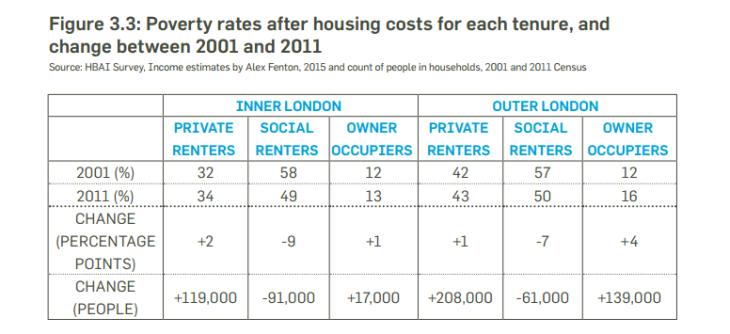Centre for London has released a new report looking at how housing is affecting inequality in the capital.
Let's start by fully depressing ourselves about the state of the housing market in London.

Don't worry private tenants, you haven't been forgotten:

Centre for London argues that it's private tenants who are bearing the brunt of the housing crisis. Social tenants are partly shielded by rents set by government, and the costs for owner-occupiers are largely set when they buy. Private tenants are at the mercy of market whims every time they move — which, given the lack of available long tenancies in the UK, can be as much as every six months.
Here's how income levels of the three main housing tenure groups changed over a decade:

Wow. If you rent privately in inner London you are screwed right now (also, your wages possibly fell in real terms over the period of the recession, but housing costs are undoubtedly a major factor in this).
Unsurprisingly, we're also seeing increases in poverty rates for private tenants — and also look at the increase for owner occupiers in outer London.

To break down that inner/outer London information even further, here's how poverty rates have changed between 2001 and 2011 by borough. Note how 'traditional' inner London boroughs have seen poverty rates fall, as it rises in much of outer London.

To try and get around the difficulty of knowing whether this is households staying in the same place and getting richer or poorer, Centre for London has looked at the skills levels in each area. The findings show an increase in average skill levels in inner London and a fall in outer London — suggesting poorer households are moving.
And just to depress you more: look how, as the wealthier you get in London, the more of that wealth comes from housing.

Centre for London acknowledges that there are many ways to measure inequality, of which housing is just one, but wants to "draw attention to the links between housing costs and inequality". The report also heavily relies on data from the 2001 and 2011 census, which means the picture does not fully capture the consequences of more recent welfare reform.
All charts taken from the Centre for London's report Housing and Inequality in London. Featured image by Matt Buck from the Londonist Flickr pool




